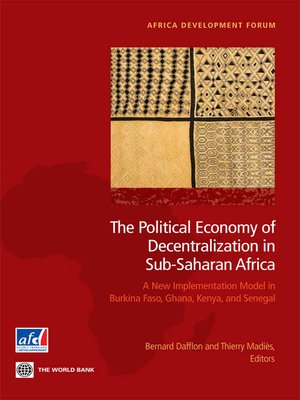The Political Economy of Decentralization in Sub-Saharan Africa
ebook ∣ A New Implementation Model in Burkina Faso, Ghana, Kenya, and Senegal · Africa Development Forum
By Bernard Dafflon

Sign up to save your library
With an OverDrive account, you can save your favorite libraries for at-a-glance information about availability. Find out more about OverDrive accounts.
Find this title in Libby, the library reading app by OverDrive.



Search for a digital library with this title
Title found at these libraries:
| Library Name | Distance |
|---|---|
| Loading... |
For the past two decades, experiments in decentralization and federalization have been developing in Africa, Asia, and the formerly communist states of Eastern Europe. Many of the powers previously in the hands of the central government or its deconcentrated structures have been transferred to lower government layers. Additionally, local governments are gradually emerging as development actors. Whatever the reasons for decentralization, the transfer of new functions to local governments can be substantive, at least in intent.
The Political Economy of Decentralization in Sub-Saharan Africa offers a new policy-oriented implementation model, applied systematically in parallel in Burkina Faso, Ghana, Kenya, and Senegal. The book studies the individual countries and compares similar issues based on the same blueprint. The analysis is not intended to assess whether the chosen decentralization model is the right one, which does not exist. Rather, it examines decentralization achievements in specific national settings and compares those achievements with the announced objectives. The divergences revealed enable decision makers to choose appropriate directions for country reform.
This method does not transpose textbook solutions to the states. The reference framework offers an analytical approach contextualized to each country that integrates not only economic arguments, but also sociopolitical ones. The authors propose an analytical guide founded on political and institutional economy. They analyze decentralized policies that help stakeholders to identify the issues, point out stumbling blocks, and ensure coherent decisions on decentralization. The book is an asset to all those involved in negotiating and implementing approaches to decentralization.







